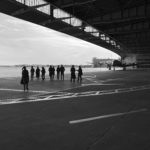Our Second New Urban Progress Trip Took Our Fellows to Chicago, Denver and Austin
Our New Urban Progress fellows travelled within the United States to explore how cities can provide examples, best practices, and solutions on how urban areas can serve as primary actors against global crises. During their visits to Chicago, Denver, and Austin, our fellows learned from experts at the local governmental, institutional, and community levels about how they approach everything from eroding trust in democracy to the climate crisis from different urban standpoints. This tour was the second of two delegation trips, after visiting Germany last fall. You can find a recap of 2021’s visit to Berlin, Leipzig, and the Ruhr Valley here.
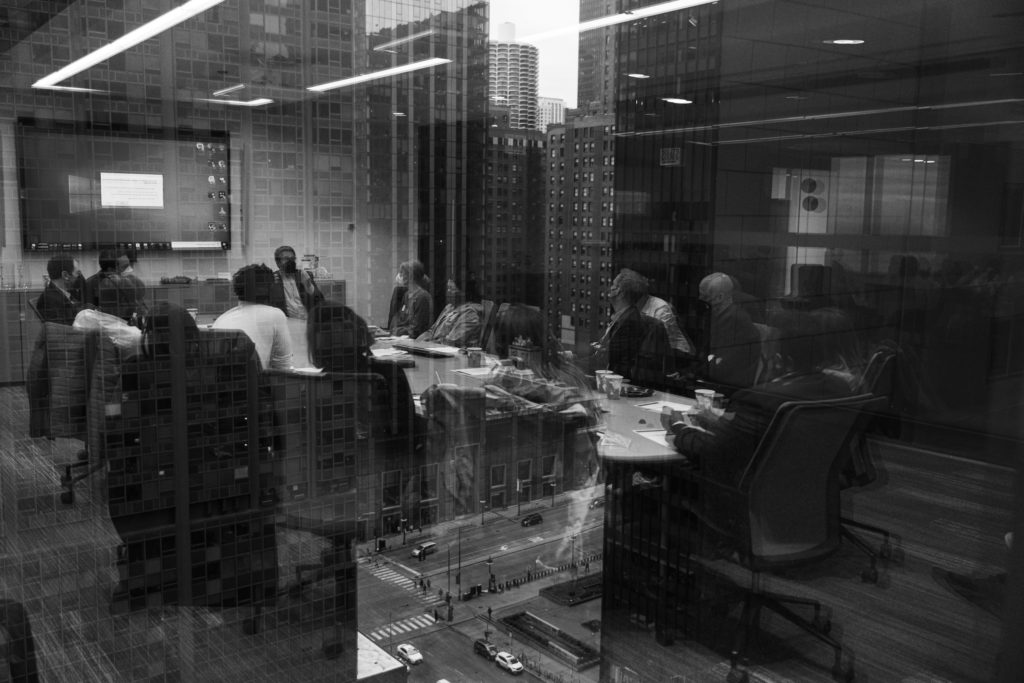
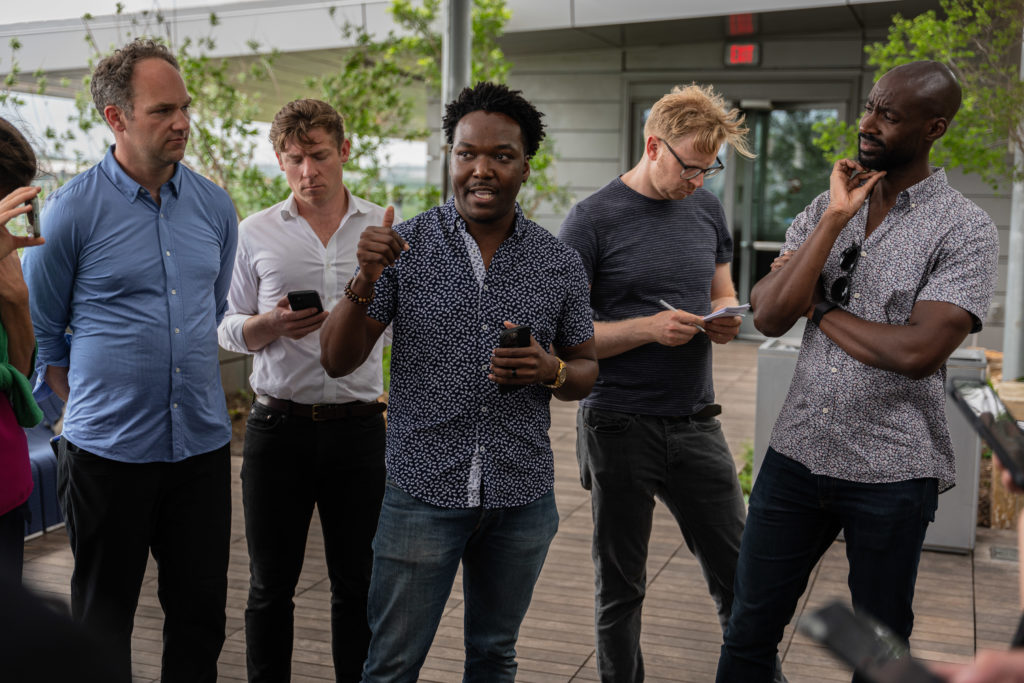

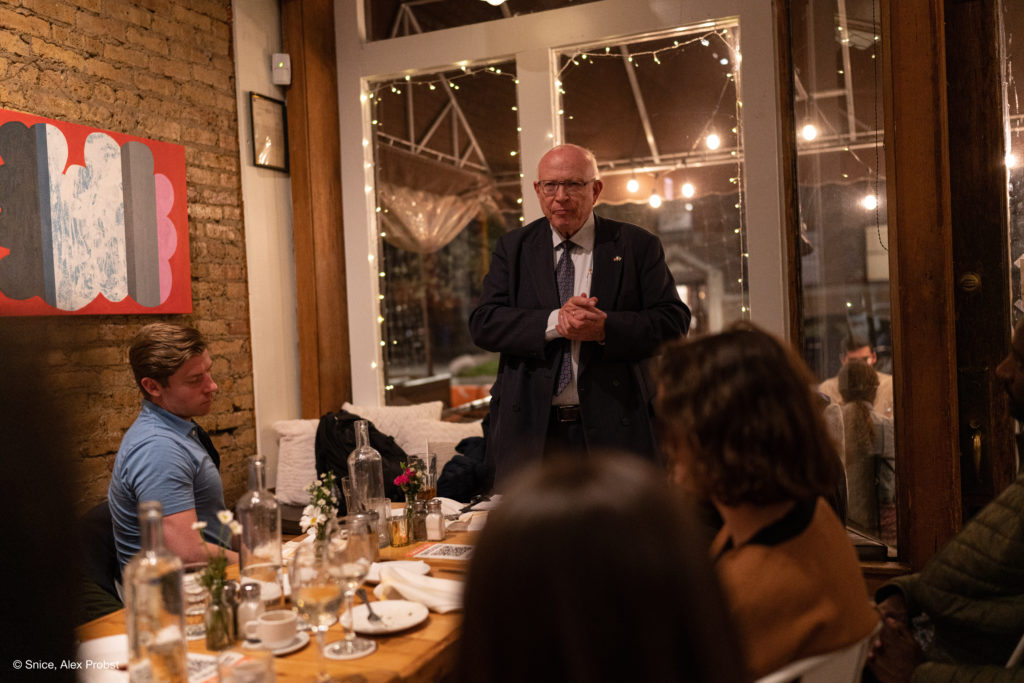
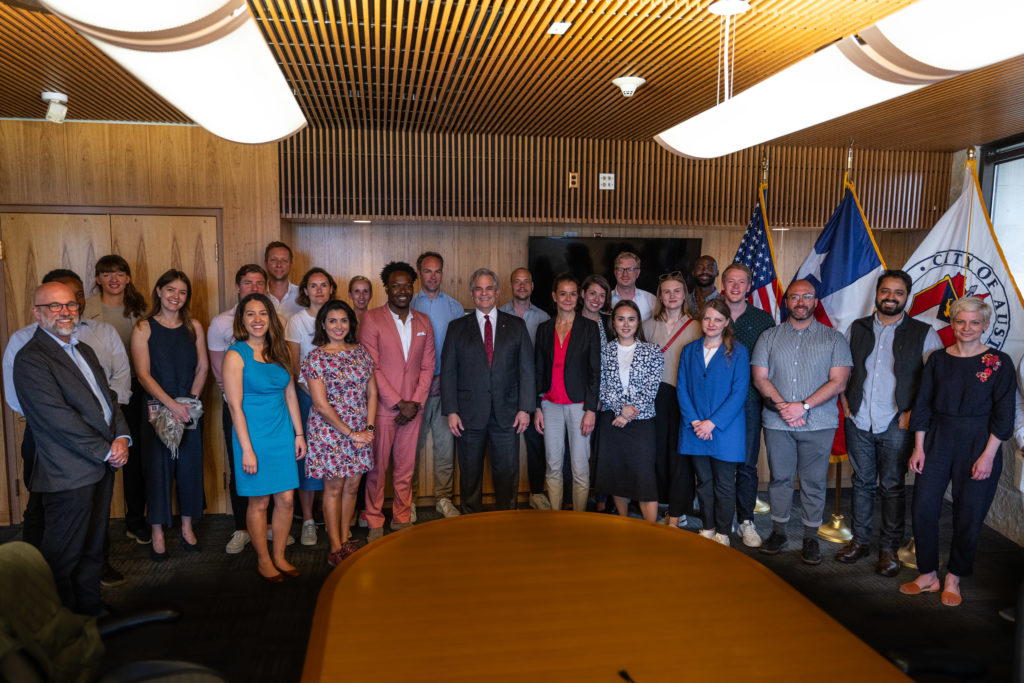
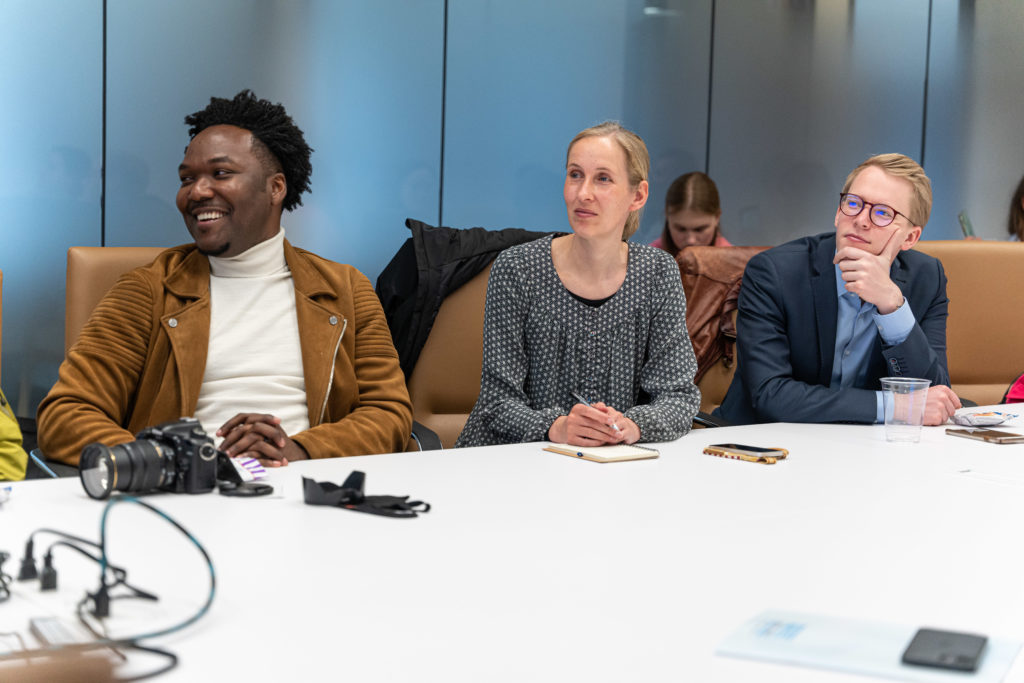
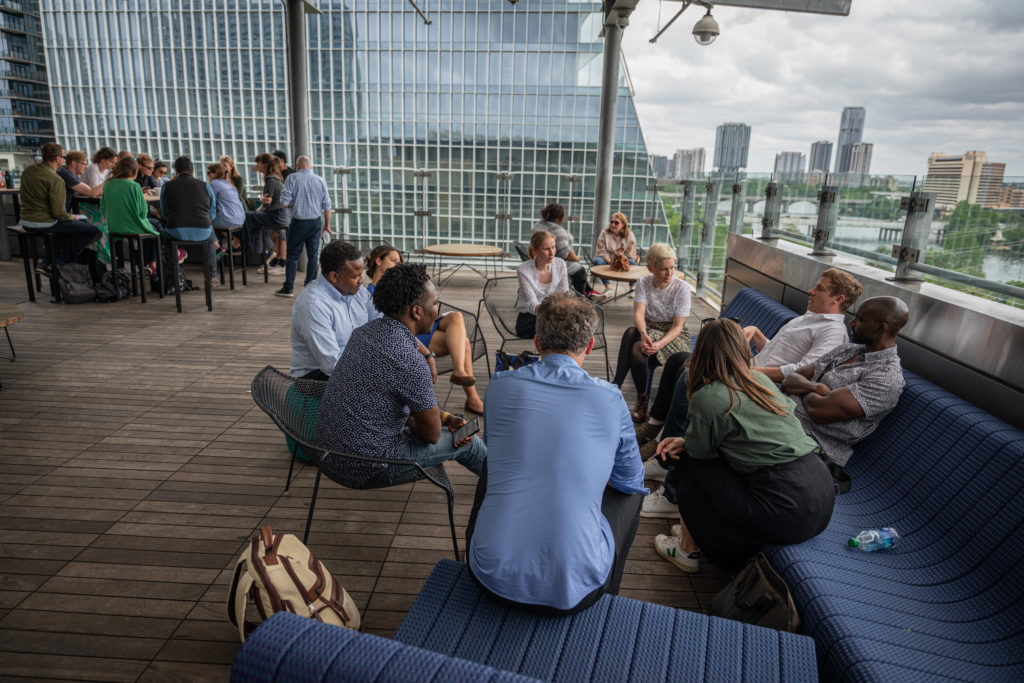
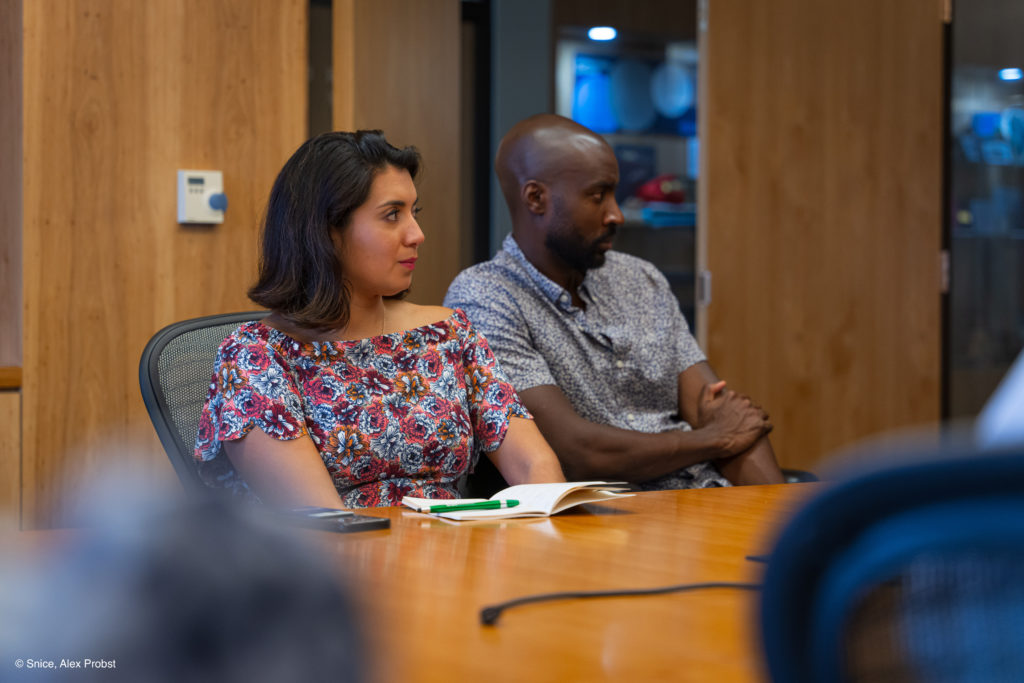

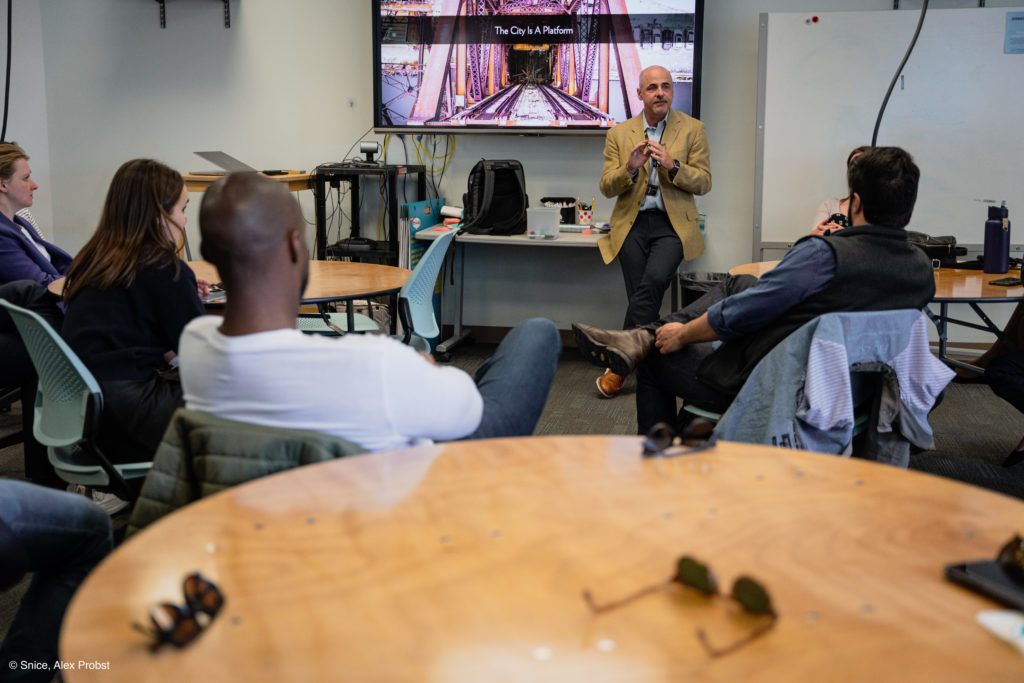
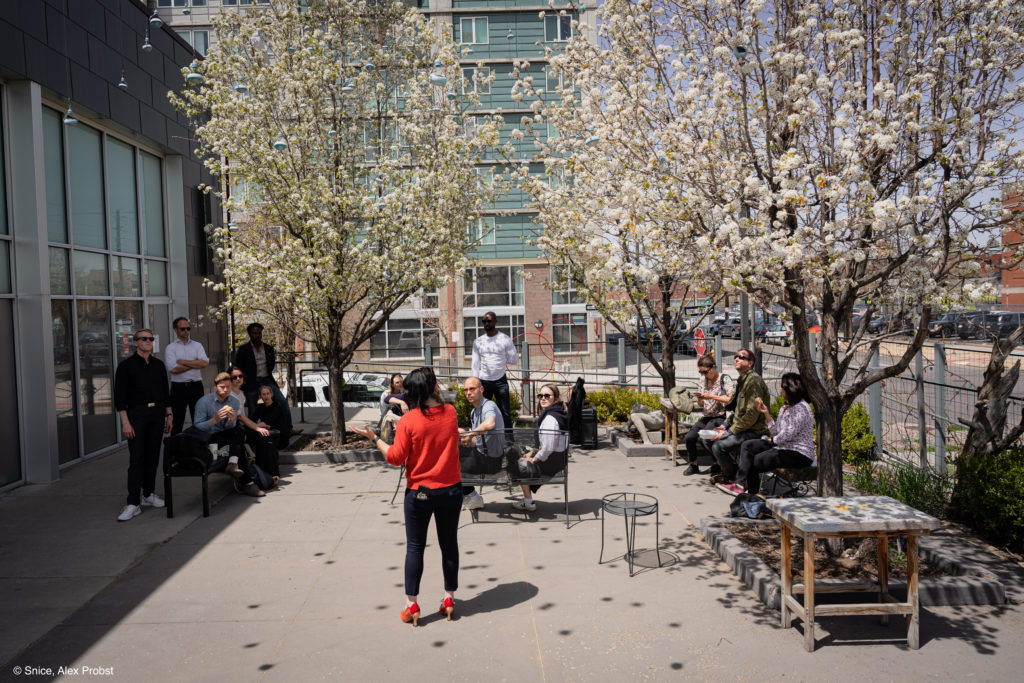
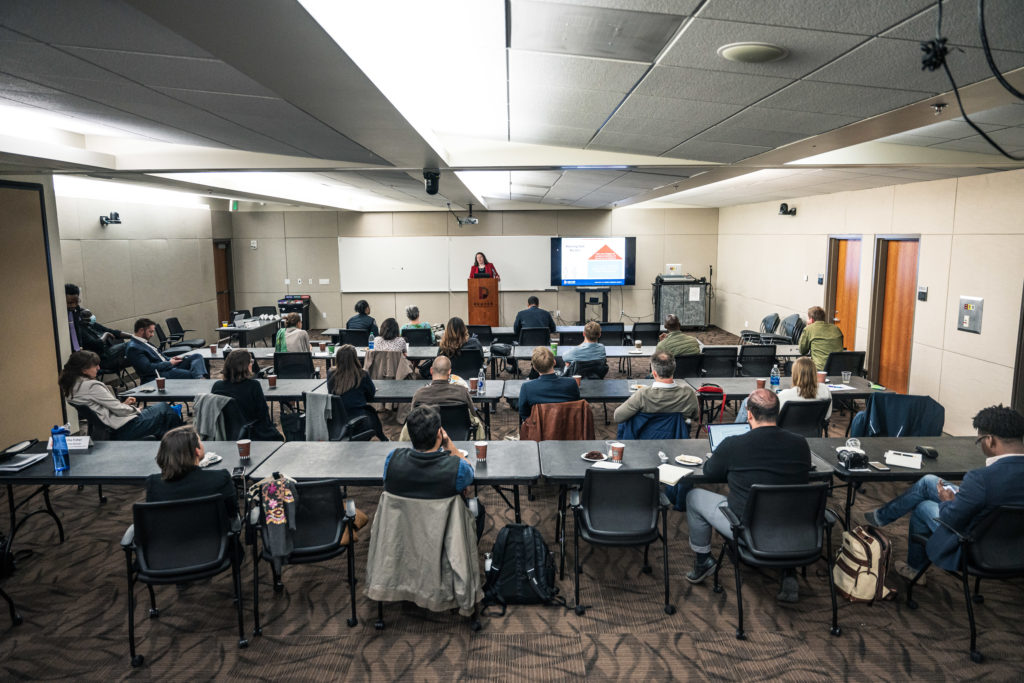
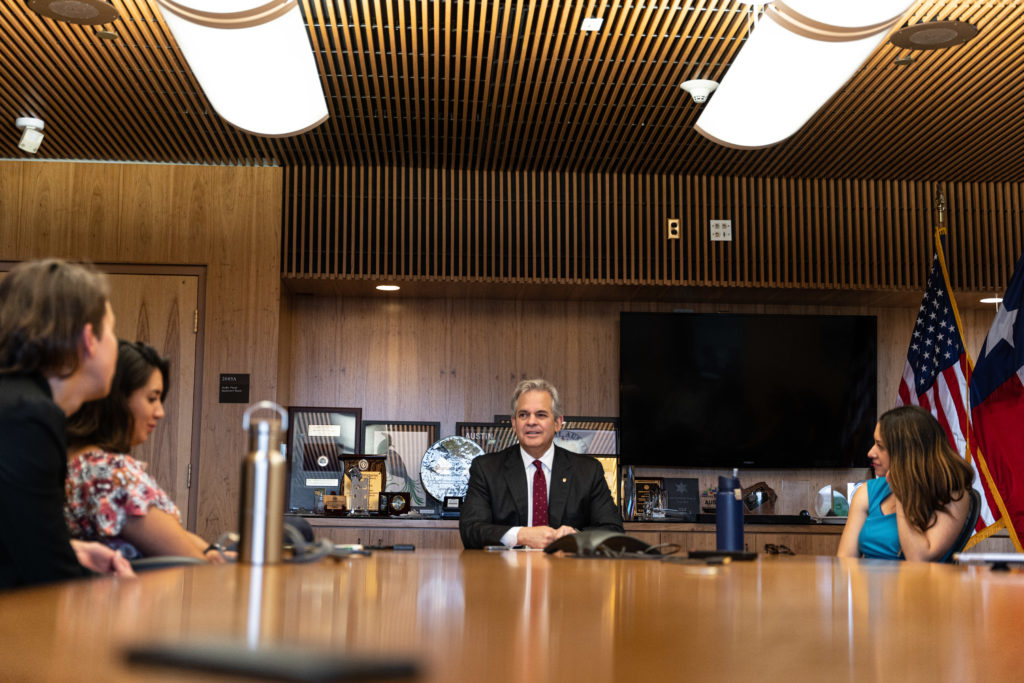
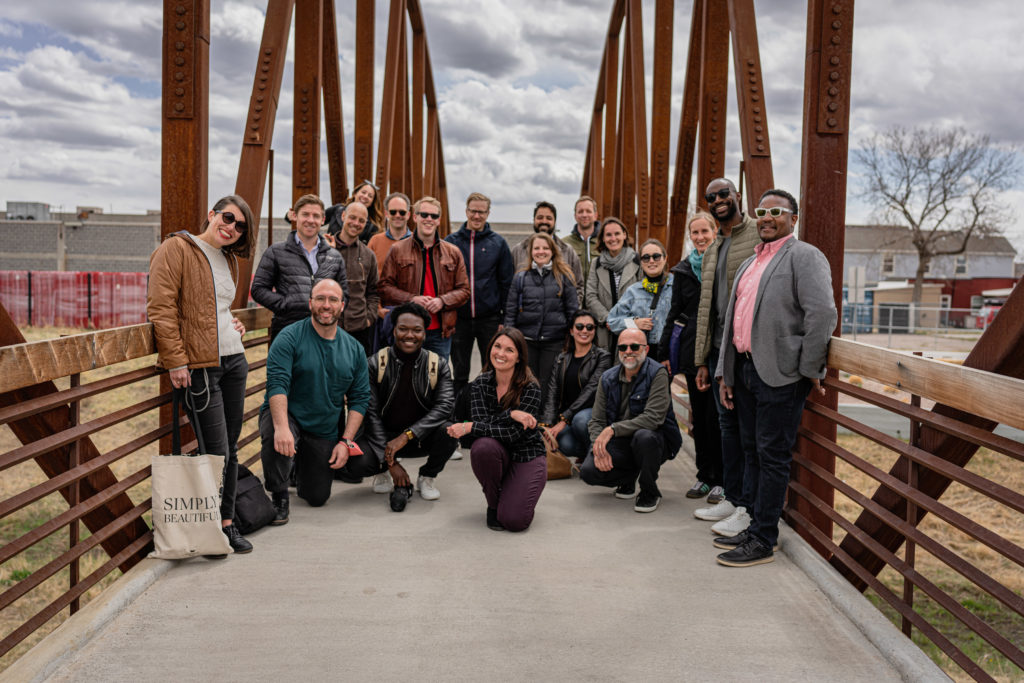
Rewatch the Highlights
Our Trip: A Week Across the United States
The first stop brought our fellows to the financial and cultural hub of the Midwest: Chicago. Our fellows explored Chicago’s role as a leading example for democratic, sustainable, and innovative urban development. The delegation kicked off their tour with several meetings with high-ranking city officials, professionals, and institutions.
 Meeting Chicago’s Deputy Mayor
Meeting Chicago’s Deputy Mayor
During their meetings with Chicago’s mayor’s office, our fellows had the opportunity to engage in a lively discussion with Deputy Mayor for Economics and Neighborhood Development, Samir Mayekar. The core topic of debate was how the City of Chicago encourages innovation and growth that is inclusive and does not leave historically excluded communities behind. How can Chicago continue to be a regional, national and international leader but also bring equity to all their communities? As Chicago faces an increasing wealth gap, racial economic inequality, skyrocketing living expenses, and all against a backdrop of the threats of climate change: What steps is Chicago taking to counter these and other challenges directly?
Chicago Council on Global Affairs
How – and why – should cities be global actors? The delegation sat down with city experts to discuss this question and more. The fellows learned about the research and publications that the Chicago Council on Global Affairs has done on the subject and left with fundamental approaches to continue working on what it means to be a transatlantic city.
World Business Chicago
The delegation met with the Executive Vice President of Innovation and Venture Strategy, Abin Kuriakose to discuss the innovation ecosystem of Chicago and how it differs from other major cities. The conversation also centered on how economic growth can be inclusive and beneficial to all residents of Chicago.
After Friday’s meetings with city actors and political researchers and institutions, our fellows had the opportunity to meet with local communities and transatlantic actors on their second day in the Windy City.
Progressive Actors on the Ground
 While touring the Chicago Lakeview neighborhood, our fellows learned about the role of local businesses, community actors, and the chamber of commerce in ensuring equitable local development in the city. The afternoon walking tour took the delegation through several neighborhoods, the economic core, a lakeside park, and the historic baseball stadium Wrigley Field. Along the way, urban planner Adam Rosa from COLLABO, the Chief of Staff of the local Alderman, and Maureen Martino the Executive Director of the Lakeview Chamber of Commerce gave concrete examples of how different actors in the community work together on creating a more democratic and equitable community to live in.
While touring the Chicago Lakeview neighborhood, our fellows learned about the role of local businesses, community actors, and the chamber of commerce in ensuring equitable local development in the city. The afternoon walking tour took the delegation through several neighborhoods, the economic core, a lakeside park, and the historic baseball stadium Wrigley Field. Along the way, urban planner Adam Rosa from COLLABO, the Chief of Staff of the local Alderman, and Maureen Martino the Executive Director of the Lakeview Chamber of Commerce gave concrete examples of how different actors in the community work together on creating a more democratic and equitable community to live in.
Round Two of Transatlantic Conversations

After last year’s successful transatlantic gathering in Berlin, our fellows partook again in a transatlantic evening in Chicago. During the dinner, German Consul General to the United States, Wolfgang Mössinger, spoke of the importance of the democratic and equitable cities providing the foundation for a stronger transatlantic relationship grounded in shared values.
Shared visions are a core pillar of transatlantic collaboration. Our fellows learned about the development at an airport on Northerly Island, which provided another example of shared transatlantic ideas.
Mueller Central Neighborhood Project
 How cities reutilize urban spaces has become a topic of debate across the Atlantic. During last year’s tour through Germany, our fellows discovered the democratically revitalized Tempelhofer Feld in Berlin, a former airport that was shut down permanently in 2008. Now one of the largest green spaces in an urban setting, the area offers opportunities for community projects and gardens, social gatherings, and recreational activities. In Chicago, our fellows learned about a similar project commissioned by the Chicago Park District. During their meeting at the Smith Group, our fellows learned about the redevelopment plans of a former airport on Northerly Island into a park and community gathering space. Equipped with a 50-acre freshwater lagoon, woodlands, and public meeting spaces, the park in progress demonstrates the potential of shared transatlantic strategies.
How cities reutilize urban spaces has become a topic of debate across the Atlantic. During last year’s tour through Germany, our fellows discovered the democratically revitalized Tempelhofer Feld in Berlin, a former airport that was shut down permanently in 2008. Now one of the largest green spaces in an urban setting, the area offers opportunities for community projects and gardens, social gatherings, and recreational activities. In Chicago, our fellows learned about a similar project commissioned by the Chicago Park District. During their meeting at the Smith Group, our fellows learned about the redevelopment plans of a former airport on Northerly Island into a park and community gathering space. Equipped with a 50-acre freshwater lagoon, woodlands, and public meeting spaces, the park in progress demonstrates the potential of shared transatlantic strategies.
Both projects in Berlin and Chicago emphasize the importance of democratic processes and public engagement during their drafting and implementation phases and are examples of successful sustainable, democratic, and innovative urban development.
After a long weekend in Chicago, our fellows flew to Denver, Colorado, to visit their second city on their delegation tour through the United States. Denver’s metro area nearly doubled its population in the last 30 years, bringing economic growth but also rising living expenses to its inhabitants. Our fellows met on their first day with city officials and community organizations dedicated to creating safe outdoor living spaces.
Sustainability as the Basis for Long-Lasting Urban Development
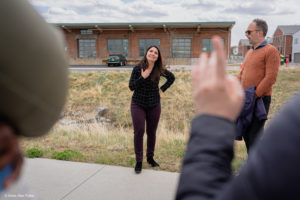
During their meeting with Cinceré Eades from Denver Parks & Rec, our fellows discussed the city’s climate adaptation and mitigation policies. As the city increasingly faces droughts, flash floods, wildfires, and other climate change-related threats, Denver has adopted various strategies to mitigate the climate’s impact on the population. Ms. Eades named the Stormwater Improvement Project as an example, which aims at preventing recurring flooding of open spaces that could otherwise serve as recreational areas. Securing urban spaces and re-utilizing them for public benefit is a core element in pursuing an urban development beneficial to all inhabitants.
Housing Hour
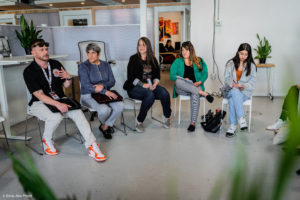
Our fellows spoke to four organizations that focus on short and long-term relief to Denverites experiencing homelessness and housing in general. The experts emphasized the importance of community engagement, networked-based community organizations, while putting lived-experience at the core of decision making, in order to create visible change in the housing crisis. Innovative solutions brought forth e.g. from the Colorado Village Collaborative, are the construction of tiny houses to bridge the living experiences from the streets to more stable housing. The core question during their talks was whether and how cities prepared for rising living expenses in times of drastic population and economic growth? While the city supports these efforts generally, our speakers pointed to the constant shortcomings of land and financial resources.
On their second day in Denver, our fellows had the opportunity to speak to officials from the mayor’s office and researchers at the University of Denver on the future urban development of Denver.
City of Denver
The City of Denver employs 13,000 workers. The delegation meet with a handful of them, including from the public safety, immigration and refugee affairs, art and culture, and housing departments. The interactive meeting gave us an inside look of how the Mile High City works towards its goals of making Denver more inclusive and equitable for all its residents.
Smart Cities
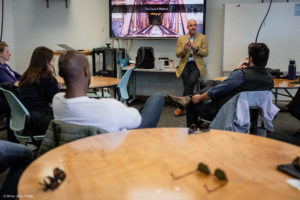 During their meeting with John Tolva and Meghan White from Colorado Smart Cities Alliances, our fellows discussed the purpose and potential of smart cities in the state of Colorado. Mr. Tolva spoke of the potential of “smart cities” in making cities more equitable during their expansion processes”, highlighting their goal to improve the quality of life beyond tech through economic development and collaborative ecosystems. Also, they discussed how Colorado as a region could work together to share best practices and technologies for a wider impact across the state.
During their meeting with John Tolva and Meghan White from Colorado Smart Cities Alliances, our fellows discussed the purpose and potential of smart cities in the state of Colorado. Mr. Tolva spoke of the potential of “smart cities” in making cities more equitable during their expansion processes”, highlighting their goal to improve the quality of life beyond tech through economic development and collaborative ecosystems. Also, they discussed how Colorado as a region could work together to share best practices and technologies for a wider impact across the state.
Our fellows traveled to Boulder, Colorado, for their final day in the Centennial State to discuss climate policies with Boulder sustainability officers.
Small City with Big Ambitions
 During their meeting with various sustainability from Boulder, our fellows learned how the city punches above its weight when it comes to climate policies at the national and international level by experimenting with policy and impactful collaboration. The delegation heard a group which included, the former Colorado State Assembly Majority Leader, a lawyer working for the Environmental Protection Agency, the former Mayor of Boulder, Boulder’s Chief Sustainability Officer, as well as an energy policy expert. For our experts, cities – and especially Boulder – are where much of the meaningful work towards a just transition and environmentally-friendly future first takes place. The question is how it can then be scaled up and out. Our speakers also discussed how coupling climate policies to economic security can make progressive energy policies more tangible to the public, also in more rural areas as they begin to face the consequences of climate change first hand.
During their meeting with various sustainability from Boulder, our fellows learned how the city punches above its weight when it comes to climate policies at the national and international level by experimenting with policy and impactful collaboration. The delegation heard a group which included, the former Colorado State Assembly Majority Leader, a lawyer working for the Environmental Protection Agency, the former Mayor of Boulder, Boulder’s Chief Sustainability Officer, as well as an energy policy expert. For our experts, cities – and especially Boulder – are where much of the meaningful work towards a just transition and environmentally-friendly future first takes place. The question is how it can then be scaled up and out. Our speakers also discussed how coupling climate policies to economic security can make progressive energy policies more tangible to the public, also in more rural areas as they begin to face the consequences of climate change first hand.
The Importance of Accessible Green Spaces for Public Health
 During their hike in the outskirts of the City of Boulder, our fellows personally experienced the benefits of wide green spaces in the urban vicinity. The importance of equal access to green areas is a point often referenced in city climate action plans (such as Chicago’s), as clean air and various other health benefits go hand-in-hand with the proximity to parks.
During their hike in the outskirts of the City of Boulder, our fellows personally experienced the benefits of wide green spaces in the urban vicinity. The importance of equal access to green areas is a point often referenced in city climate action plans (such as Chicago’s), as clean air and various other health benefits go hand-in-hand with the proximity to parks.
After traveling from Denver to Austin for their final stop on the NUP delegation tour, our fellows kicked off their visit with an audience at the mayor’s office.
 Meeting Mayor Adler
Meeting Mayor Adler
Through its C40 network and other collaborations, Austin aims to share best practices with other mayors and contribute to ambitious climate policies internationally. Mayor Adler spoke of the need to manage population growth rather than encouraging it – for Adler you give 100% effort in managing growth, compared to 0% effort in encouraging it. As the city currently records nearly 160 new people per day and property value jumped from $350,000 to $650,000 in the last two years alone, he emphasized the responsibility to ensure access to basic services and affordable housing. Regarding democratic participation, Mayor Adler spoke of making democratic platforms, such as town hall meetings, more flexible and accessible to community members. A Democratic bastion on a highly Republican state, our meeting with Mayor Adler offered invaluable insight into how a city can pursue and implement progressive energy, housing, and innovative policies despite conservative state directives.
Black Austin Tour
During their first afternoon, the delegation went on a tour of Austin’s historic black neighborhood to understand the historic inequalities and their influences on current politics in the city. Led by a neighborhood local, the delegation learned about prominent Black community leaders, visited several museums and discussed how different communities have contributed to the richness of the neighborhood.
On their final day in Austin, our fellows had the opportunity to observe yet again another example of transatlantic visions and continue to explore Austin’s climate strategy.
Transatlantic Visions of Urban Spaces

Democratically transforming a former airport in Austin into living and recreational areas – sound familiar?
After visiting Tempelhofer Feld in Berlin and Northerly Island in Chicago, our delegation continued to learn about innovative ways the grounds and buildings of former airports can be re-invented for community spaces, affordable housing, and green areas in urban settings. The Mueller plan to redevelop the former Robert Mueller Municipal Airport site in Austin focuses on ensuring diverse, affordable, and sustainable housing. While inspirational, our guides also discussed city legislation that prevents similar developments in other parts of Austin.
Rethink35
The group met with activists from Rethink35, who are advocating for stopping the current freeway expansion of the the I-35, which goes directly through the city and has historically segregated Austin. They gave their takes on how they work in networks with other groups and how they are trying to gain more support at City Hall for their cause.
Democratizing Policy-Making
Our fellows also discussed democratic engagement in city policies by the example of the Austin Climate Equity Plan, which was adopted by the city council in 2021. The plan’s goal is to equitably reach net-zero community-wide greenhouse gas emissions by 2040. During the drafting process, special emphasis was laid on engaging with racially and economically diverse residents about the challenges, barriers, and opportunities facing historically excluded groups. This policy serves as a prime example of how community actors can be included and contribute to forming policies impacting their living spaces directly.
 Going home with new ideas
Going home with new ideas
After nine long days of traveling through the United States and visiting three cities, our fellows concluded the second New Urban Progress delegation tour on Saturday. Reflecting on the meetings and people they were able to meet, discuss with, and learn from, our fellows will now begin the next phase of the project and finalize their three papers on how cities can become key actors in the fight against global challenges.
After visiting cities in the US and Germany, our fellows will come together in their working groups to prepare the final papers for the paper launch in July. Stay tuned for more information about their discoveries on how urban spaces can shape progressive politics
New Urban Progress is the joint metro initiative of Das Progressive Zentrum, the Alfred Herrhausen Gesellschaft and the Progressive Policy Institute. The project was supported by the Transatlantic Program of the Federal Republic of Germany, funded by the European Recovery Program (ERP) of the Federal Ministry for Economic Affairs and Climate Action (BMWK).


